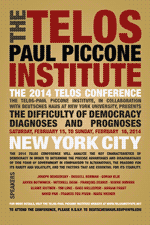The following paper was presented at the Eighth Annual Telos Conference, held on February 15–16, 2014, in New York City.
 In the perspective of many, the prime criticism of liberal theories of democratic politics is that such theories proceed with a certain false and idealized individual in mind—these are great theories, elegant or hubristic, but at bottom, theories and not “real politics.” Political liberalism wrongly imagines the citizen to be a rational individual, sure of his will and life plans—or is this imagining wrong? The deeper critique holds that liberalism describes a peculiar individual, and that this individual really exists, but looks strangely like the liberal theorist and his class. Thus, for example, John Rawls’s theory of justice is suggested to fail women and the profoundly disabled. My critique today follows in this vein; I wish to add to this characterization of liberalism’s presumed political actor by showing him to be antiheroic.
In the perspective of many, the prime criticism of liberal theories of democratic politics is that such theories proceed with a certain false and idealized individual in mind—these are great theories, elegant or hubristic, but at bottom, theories and not “real politics.” Political liberalism wrongly imagines the citizen to be a rational individual, sure of his will and life plans—or is this imagining wrong? The deeper critique holds that liberalism describes a peculiar individual, and that this individual really exists, but looks strangely like the liberal theorist and his class. Thus, for example, John Rawls’s theory of justice is suggested to fail women and the profoundly disabled. My critique today follows in this vein; I wish to add to this characterization of liberalism’s presumed political actor by showing him to be antiheroic.


